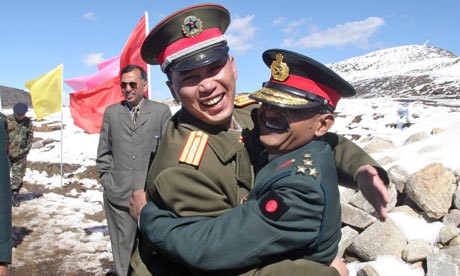 The standoff between India and China in the Depsang Bulge area of eastern Ladakh appeared to have ended late on Sunday after armed forces of both countries simultaneously withdrew from the face-off point.
The standoff between India and China in the Depsang Bulge area of eastern Ladakh appeared to have ended late on Sunday after armed forces of both countries simultaneously withdrew from the face-off point.
According to official sources, intensive diplomatic contacts spearheaded by Foreign Secretary Ranjan Mathai, in coordination with military authorities, and with Indian Ambassador JaiShankar in Beijing, led to a flag meeting in which the face to face situation was resolved.
Chinese and Indian armies agreed to withdraw their troops simultaneously from face off point at Daulat Beg Oldi sector in Ladakh, ending the tense bilateral encounter brought on after a platoon of Chinese PLA forces set up camp on April 15 almost 19 kms inside what India claims as its territory. While the boundary between the two Himalayan neighbours remains undemarcated, India claims Chinese troops intruded well into its territory.
Sunday's simultaneous withdrawal of forces brings to an end probably the worst bilateral border standoff in decades, one which saw troops of both countries in what the official MEA spokesman called a "face-to-face" situation. The situation had threatened to spiral into a political and diplomatic standoff, with suggestions that India could call off the visit by its External Affairs Minister Salman Khurshid to Beijing next week.
Khurshid is scheduled to visit Beijing on May 9, to acquaint himself with the new leadership of the Chinese foreign ministry, and to broadly outline an agenda for the forthcoming visit to India by new Chinese premier Li Keqiang later this month. By his own declaration, Prime Minister Li has chosen to visit India as one of his first destinations abroad since he assumed office. According to analysts, the new leadership which has assumed office in Beijing in March, would not want to jeopardise its increasingly wide-ranging and multi-faceted relationship with New Delhi by appearing overtly aggressive.
There have been indications that, although the People's Liberation Army (PLA) has been expanding its all-round capabilities, in line with China's rising international and economic prowess, and is particularly keen to play a major role in foreign policy, the new civilian leadership is not keen for it to assume a stance that would threaten an economic slowdown.
Although initially reluctant to even consider the setting up of tents by PLA troops as an "incursion", Beijing has agreed to a climbdown after four failed flag meetings between local commanders. Reports suggest that the agreement between both countries was reached after tough negotiations at top diplomatic and military level on both sides.
Indian and Chinese commanders at the local level shook hands before pulling back from their "face-to face" positions and completed the withdrawal process by 1930 hours on Sunday, sources told PTI.
India which pressed for restoration of the status quo ante, urging China to remove its troops from Depsang and return beyond the Line of Actual Control to positions that prevailed prior to April 15.
While India is not claiming 'victory', there is a clear sense of enormous relief that the status quo has been restored. The face off in Ladakh had cast a shadow over the forthcoming high level visits scheduled by senior political leaders of both countries.
Tensions peaked on Saturday when Khurshid had told reporters on his way to Iran that progress in the dialogue to end the standoff in eastern Ladakh was not satisfactory.
India, he said, would have liked a "much better response" from China, reiterating that New Delhi sought reversal of the "adverse incident" in Ladakh and return to the status quo ante in the Depsang Valley where the Chinese troops had intruded. Failing this his visit, although formally announced by Beijing yesterday, was in danger of being called off.
Nilova Roy Chaudhury is Editor-in-Chief of the Indian Review of Global Affairs